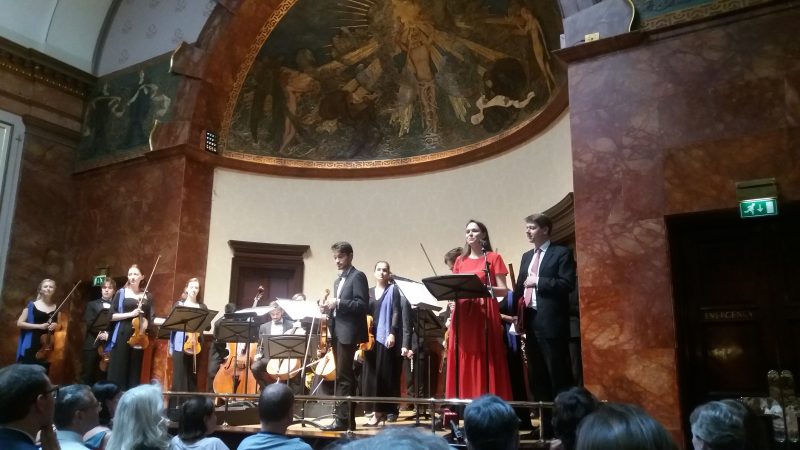On 5th July, London’s Wigmore Hall was the venue for an ‘Austrian-themed’ concert given by the Ensemble of the European Union Youth Orchestra, along with the cellist, Kian Soltani. Marking the inauguration of the Austrian Presidency of the Council of the European Union, the Wigmore Hall, packed with guests and members of London’s Austrian Embassy, heard welcome speeches from Katharina Kastner, the Chargé d’Affaires of the Austrian Embassy in London, along with Robin Walker, MP for Worcester and Parliamentary Under-Secretary at the Department for Exiting the European Union.
The Chargé d’Affaires explained that Austria’s priorities for the upcoming presidency comprise: the fight against illegal immigration by securing external borders, maintaining Europe’s competitiveness through digitisation, and stability in Austria’s neighbouring countries – notably, working towards EU accession for Western Balkan countries.
Ms Kastner explained that, during its Presidency of the Council, Austria will work on issues including internal and external security; the protection of external borders; reform of the Common European Asylum System; the Digital Single Market; Energy Union; the budget for 2019; the Multiannual Financial Framework post-2020; EU enlargement; the European neighbourhood, and the conclusion of the negotiations about the UK’s exit from the European Union (Brexit).
The concert programme began with the UK première of ‘Ma’, a work by the Austrian composer Gabriele Proy, who was among the audience to hear her work performed. ‘Ma’ had been commissioned by the Wiener Concert-Verein (where she is ‘composer-in-residence’) and the chamber orchestra of the Wiener Symphoniker.
Works by Ms Proy’s fellow Austrian composers – Joseph Haydn, Wolfgang Amadeus Mozart and Ludwig van Beethoven – completed the programme.
Cellist Kian Soltani – playing the ‘London’ Stradivarius 1694 cello (on loan from the J&A Beare International Violin Society) – was the soloist in Joseph Haydn’s Concerto for Cello in C minor, Hob.VIIb:1. Both the soloist and the ensemble gave a lively, spirited interpretation of the piece, ably communicating their obvious sense of enjoyment in creating the piece for a highly appreciative audience.
The Ensemble continued by playing Mozart’s Divertimento in D major K136 and the afternoon’s performance concluded with an orchestral version of the ‘Ode to Joy’ from Beethoven’s ninth symphony – which may be better known colloquially as the anthem of the European Union.
As Katharina Kastner had remarked, the music for this anthem came about because, in 1817, the Philharmonic Society of London had commissioned Beethoven to write a symphony – although he didn’t start serious work on the new piece until 1822. The first three movements of the symphony were for the orchestra alone, but the composer knew he needed to end the work with something special. Then he recalled Schiller’s ‘Ode to Joy’ poem and the rest, as they say, is history.
History has something to say about the Wigmore Hall, too. It was built in 1901 by the German piano firm, Bechstein, next to its showrooms on Wigmore Street. The Hall was intended to be grandly impressive while remaining intimate enough for recitals. Originally called Bechstein Hall, it was renamed in 1917 – in the wake of the anti-German feeling that arose as a result of the Great War (1914 – 1918).
Just over 100 years later, as the Ensemble of the European Union Youth Orchestra began to play the European anthem, the audience in the Wigmore Hall got to its feet respectfully. Mr Walker had made his excuses and left for more pressing business elsewhere – no doubt continuing to play his part in helping the UK remain on track to leave the EU in March 2019.
The concert had successfully marked the inauguration of the Austrian Presidency of the Council of the European Union. Concluding with the anthem, in this venue at this time, seemed a poignant act to herald the beginning of an end of an era.







Leave A Comment
You must be logged in to post a comment.